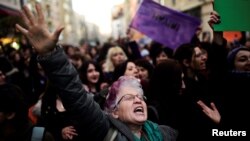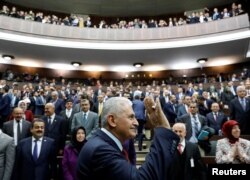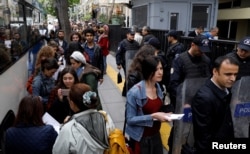Turkey's prime minister hit back Tuesday at European monitors who said more than 2 million votes could have been manipulated in Sunday's closely contested referendum on expanding presidential powers.
Binali Yildirim, responding to criticism from the Council of Europe's observer mission, said debate over the outcome of the referendum was "over," and that "the people's will had been reflected at the ballot box."
He spoke in response to calls from the council to investigate alleged vote irregularities that several official observers said allowed as many as 2.5 million uncertified ballots to be counted.
Alev Korun, an Austrian member of the council's observer mission, said the number of uncertified ballots would almost double the margin of President Recep Tayyip Erdogan's victory — an electoral win that vastly broadens the power of the presidency.
Another observer, German lawmaker Andrej Hunko, told The New York Times "it seems credible that 2.5 million were manipulated, but we are not 100 percent sure."
Separately, European monitors alleged that those who campaigned against Erdogan's push for expanded powers faced numerous obstacles, including a lack of freedom of expression, intimidation and access to the media. The Organization for Security and Cooperation in Europe also alleged misuse of administrative resources by Erdogan ahead of Sunday's vote.
Dramatic shift signaled
Sunday's vote created a powerful executive presidency that largely sidelines the Turkish parliament and abolishes the Cabinet and the office of prime minister. Ministers will be directly appointed by the president, who also will set the national budget. The president also will appoint judges to the high court and the constitutional court.
The constitutional amendments also end the official neutrality of the presidency, allowing a president to lead a political party and declare states of emergency.
Critics argued the reforms were tantamount to creating an elected dictatorship, while Erdogan and his supporters said they would create a fast and efficient system of government better able to confront terrorism and a sluggish economy.
Unstamped ballots
Opposition complaints and calls for a new vote centered on a decision by electoral officials to use and tally ballots that did not have an official stamp, despite a 2010 law that requires such official validation. Additional complaints included the barring of nearly 200 opposition members from serving as election monitors and the temporary detention of other election observers.
On Monday, the head of Turkey's electoral board, Sadi Guven, strongly defended his decision to allow the controversial ballots, citing high demand for ballots and saying similar procedures had been followed in the past.
"This is not some move we've done for the first time," said Guven, speaking to reporters Monday in Ankara. "Before our administration took over, there had been many decisions approving the validity of unstamped ballots."
Trump congratulates Erdogan
U.S. President Donald Trump on Monday congratulated Erdogan on his referendum victory.
The White House said in a statement the two leaders spoke by phone, with their conversation also including the need to hold Syrian President Bashar al-Assad accountable for a recent chemical attack. It further said the two leaders discussed the fight against Islamic State and "the need to cooperate against all groups that use terrorism to achieve their ends."













